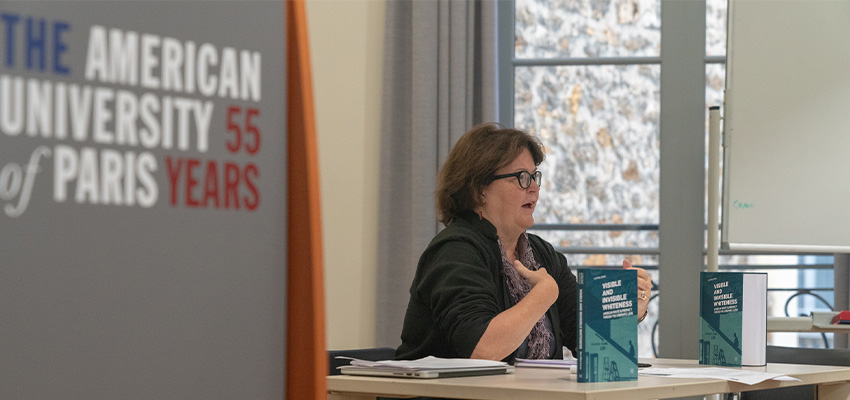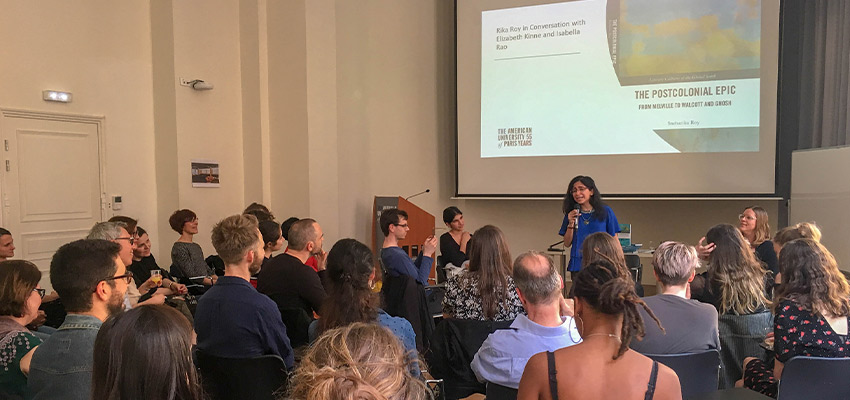- About AUP
- History of AUP
- Mission & Core Values
- Vision and Leadership
- AUP Recognition
- Alumni Success
- Campus Development
- Arts at AUP
- Policies & Guidelines
- Academics
- Undergraduate
- Graduate Programs
- MA in Diplomacy and International Law
- MA in Global Communications
- MSc in Human Rights and Data Science
- MA in International Affairs
- MA in International Affairs, Conflict Resolution, and Civil Society Development
- MSc in International Management
- MSc in Strategic Brand Management
- Find Your Thesis Advisor
- Previous Programs
- Cultural Program
- Faculty
- Summer School
- Research Centers
- The Center for Critical Democracy Studies
- Upcoming Events
- Research Projects
- Fellows’ Publications
- Publishing
- Curriculum
- Community
- Visiting Scholars
- CCDS Highlights
- Atelier de Théorie Politique – Paris
- Critical Theory 101: Future Directions and New Challenges
- Martti Koskenniemi on “The Law of International Society: A Road not Taken”
- Academic Freedom Symposium
- Tocqueville Colloque 2023
- Violent Turns Conference
- Degenerations of Democracy
- DEMOS21 Inaugural Event
- What Demos for the 21st Century?
- The Paris Centennial Conference
- Justice Stephen Breyer
- Civic Jazz - The Launch of the Center
- Past Events
- FR
- The Center for Writers and Translators
- The George and Irina Schaeffer Center for the Study of Genocide, Human Rights and Conflict Prevention
- The Joy and Edward Frieman Environmental Science Center
- The Center for Media, Communication & Global Change
- The Center for Critical Democracy Studies
- Departments
- Academic Resources
- Academic Affairs
- Academic Calendar
- Academic Resource Center
- Library
- Registrar's Office
- Teaching and Learning Center
- Employer Network
- Accessibility & Accommodation Services
- AI@AUP: A Campus-Level Initiative
- Quai D'Orsay Learning Commons
- Paris as Classroom
- ACE Center
- Admissions
- Student Life
- Campus
- Student Leadership & Involvement
- Paris
- Support Services
- Student Development Help Desk
- Student Accounting Services
- Student Immigration Services
- Student Grievance Procedure
- Diversity and Inclusion
- Health & Well-being
- Digital Student Handbook
- News
- Events
- AUP Giving
- Housing Offer for 2025-2026
- IT Services
- Alumni
- About AUP
- History of AUP
- Mission & Core Values
- Vision and Leadership
- AUP Recognition
- Alumni Success
- Campus Development
- Arts at AUP
- Policies & Guidelines
- Academics
- Undergraduate
- Graduate Programs
- MA in Diplomacy and International Law
- MA in Global Communications
- MSc in Human Rights and Data Science
- MA in International Affairs
- MA in International Affairs, Conflict Resolution, and Civil Society Development
- MSc in International Management
- MSc in Strategic Brand Management
- Find Your Thesis Advisor
- Previous Programs
- Cultural Program
- Faculty
- Summer School
- Research Centers
- The Center for Critical Democracy Studies
- Upcoming Events
- Research Projects
- Fellows’ Publications
- Publishing
- Curriculum
- Community
- Visiting Scholars
- CCDS Highlights
- Atelier de Théorie Politique – Paris
- Critical Theory 101: Future Directions and New Challenges
- Martti Koskenniemi on “The Law of International Society: A Road not Taken”
- Academic Freedom Symposium
- Tocqueville Colloque 2023
- Violent Turns Conference
- Degenerations of Democracy
- DEMOS21 Inaugural Event
- What Demos for the 21st Century?
- The Paris Centennial Conference
- Justice Stephen Breyer
- Civic Jazz - The Launch of the Center
- Past Events
- FR
- The Center for Writers and Translators
- The George and Irina Schaeffer Center for the Study of Genocide, Human Rights and Conflict Prevention
- The Joy and Edward Frieman Environmental Science Center
- The Center for Media, Communication & Global Change
- The Center for Critical Democracy Studies
- Departments
- Academic Resources
- Academic Affairs
- Academic Calendar
- Academic Resource Center
- Library
- Registrar's Office
- Teaching and Learning Center
- Employer Network
- Accessibility & Accommodation Services
- AI@AUP: A Campus-Level Initiative
- Quai D'Orsay Learning Commons
- Paris as Classroom
- ACE Center
- Admissions
- Student Life
- Campus
- Student Leadership & Involvement
- Paris
- Support Services
- Student Development Help Desk
- Student Accounting Services
- Student Immigration Services
- Student Grievance Procedure
- Diversity and Inclusion
- Health & Well-being
- Digital Student Handbook
- News
- Events
- AUP Giving
- Housing Offer for 2025-2026
- IT Services
- Alumni
Related Links
- Year in Review: India Practicum, January 2018
- Year in Review: UNICEF on Campus, February 2018
- Year in Review: Launching the GPS Program, March 2018
- Year in Review: Deborah Roberts and the Women of 2018, April 2018
- Year in Review: Words That Kill, May 2018
- Year in Review: Summer at AUP, June 2018
- Year in Review: The Hemingway Conference, July 2018
- Year in Review: Honoring AUP Leadership, August 2018
- Year in Review: Orientation at AUP, September 2018
- Year in Review: One Year of AUP Global, November 2018
- Year in Review: A New Home on the Seine, December 2018
AS WE MOVE QUICKLY TOWARDS A NEW YEAR, WE ARE TAKING A MOMENT TO LOOK BACK AT SOME OF THE HIGHLIGHTS OF 2018 WITH OUR SERIES: A YEAR IN REVIEW. THIS WEEK, WE’RE DEDICATING OUR REVIEW TO RECOGNIZING OUR INCREDIBLE FACULTY, AND WHAT HAS BEEN ANOTHER EVENTFUL AND PRODUCTIVE YEAR IN THE ACADEMIC LIFE OF AUP.
It has been a thrilling year for AUP both inside and outside the classroom and along the way, we’ve enjoyed commemorating the numerous achievements of our faculty. One of the recent accomplishments celebrated on campus this October was the launch of Professor Alice Mikal Craven's new book, Visible and Invisible Whiteness - American White Supremacy through the Cinematic Lens. Craven utilizes the pages in her book to explore films that are not often considered in the context of racial tensions; she notes, “we’re going to learn more through the films that were forgotten than those that were selected for the canon”. Along with her exploration of cinema’s portrayal of racialized differences, her text explores personal experiences from her childhood. Craven recounts the arrival of a black couple in her church. The pastor’s acceptance of their presence in the congregation incited other members to call for his resignation. “One of the things I learned is that when I lived in the South, I saw things that I thought were unjust, then I moved to the North to get away from them only to discover that there is racism everywhere… Eventually, I realized that what I thought was an escape from the racial oppression of where I grew up was actually something that still exists, but in a very different form here [in Europe]. This gave me a window through which I could look, from a distance, at the things I wanted to write about.” Using her experiences, her studies of racial tensions in Europe through the Franco-Algerian war, and her expertise in cinema and literature, Craven is able to create a unique lens through which she makes sense of how racism functions in contemporary America.

Professor Alice Craven at her book launch, October 2018

Professor Stephen Sawyer at his book launch, April 2018

Professor Rika Roy at her book launch, April 2018

Professor Brian Schiff with Dr Aura Lounasmaa for an event on refugees and the politics of participation, September 2018

Professors Ziad Majed and Susan Perry at the student-organized Migration Conference, June 2018

Deborah Roberts on campus for a talk on "Women: Reaching great heights without being Superwoman", April 2018
At AUP, teaching and research go hand in hand, each aspect of academic life on campus informing and influencing the other. Students benefit from the opportunity to produce research and develop their thinking alongside faculty who are deeply engaged in their own exploration of topics, creating a unique environment of vibrant exchange. In recent years, producing an annual report of Faculty Achievements, the Provost’s Office reported an astonishing record of scholarly productivity on the part of our faculty. Among the work celebrated over the last twelve months were five book launches including that of Sneharika Roy, Russell Williams, Hall Gardner, Stephen Sawyer, and Albert Wu. Subjects located across the literary spectrum tackled ideas from political unrest and nationalism in Gardner’s latest book World War Trump: The Risks of America’s New Nationalism. Other works explored contemporary and historic literatures in order to discover new findings and draw new conclusions from influential pieces of literature in Professor Roy’s The Postcolonial Epic: From Melville to Walcott and Ghosh and Professor William’s series of essays Trois théories sur l’Enfer conjugal. The pens of our institution’s educators have been actively writing new contributions to literature, redefining their fields and contributing to knowledge on their respective topics.
Beyond publications, our faculty have attended and hosted a remarkable number of international conferences, as well as sharing their expertise at home through a full calendar of lectures, discussions, readings and seminars on campus. We have been graced by the likes of Emmy Award-winning host and news veteran Deborah Roberts as well as Pulitzer prize nominated war poet journalist James Adams and activist and public policy maker Joseph Robertson. We have held numerous faculty-organized conferences like Words the Kill in May, Hemingway in Paris in July, and #MeToo and #BalanceTonPorc: Translating Feminism in February. It is these experiences that will enrich the experience of our students, offering them a stimulating look at their classes brought to life in real world academic, social and political contexts.
To close this eventful year which has brought us numerous opportunities for growth, development, and self-improvement, we will be launching a special rendition of the AUP Magazine, the first ever Faculty Edition! This issue has allowed us to highlight the achievements of our faculty and the work they carry out in our classrooms and beyond. The magazine, which features articles entirely written by our academic community, recognizes AUP’s faculty and their engagement with essential contemporary issues, and their commitment to connecting our students to these issues through immersive and hands-on learning opportunities. It is remarkable to reflect on the work we are able to do when we approach complex topics together. The new issue will be released on Monday, December 17 – so stay tuned for updates on the AUP website and social media channels.
